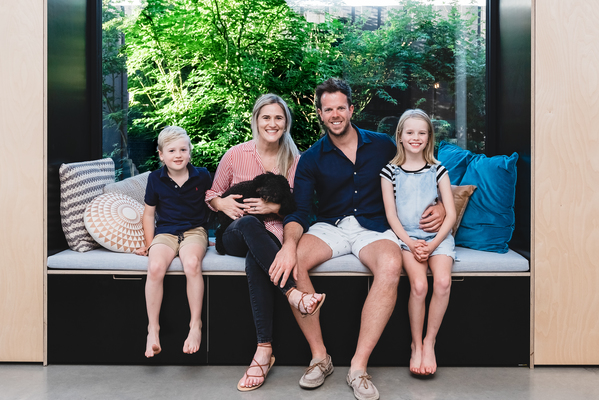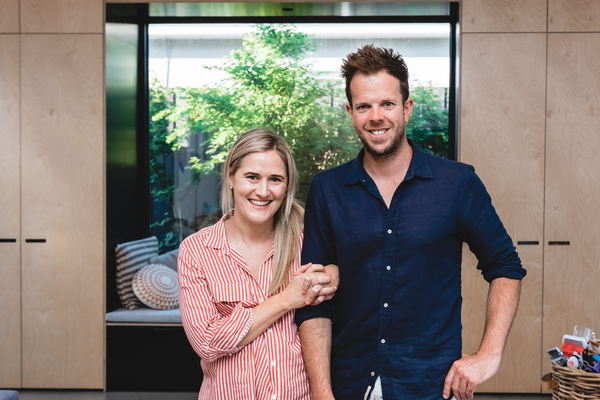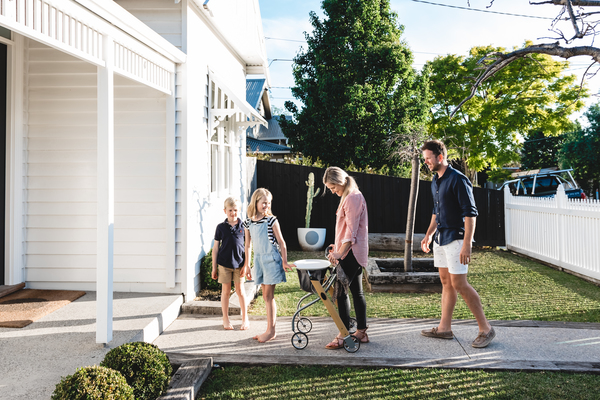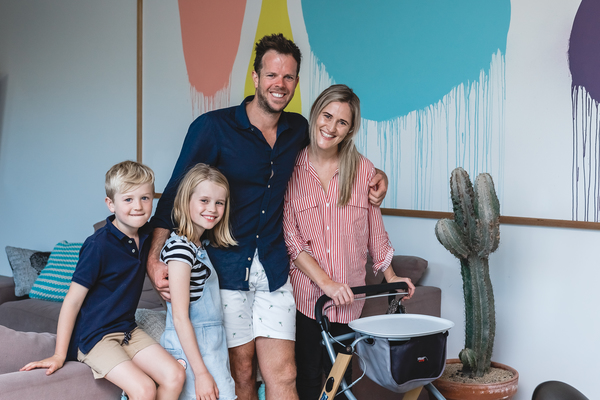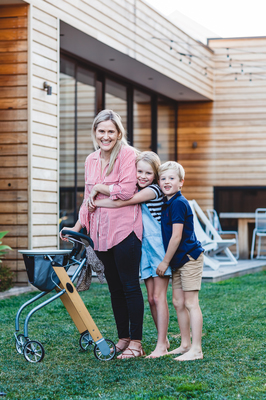By Angie Hilton
By Angie Hilton
The name Leah Alstin had been mentioned to me by a few people who described her as an amazing local woman I should meet.
As a 35-year-old mother of two school-aged children, Leah faces the same challenges we all do – raising a family, running a household, work/life balance and finding time for ‘date night’. But Leah also faces a bigger challenge – she has a rare condition called Friedreich’s ataxia.
Friedreich’s ataxia is a degenerative muscle disease which leads to loss of muscle coordination, fatigue, vision impairment, hearing loss and slurred speech, scoliosis, diabetes and serious heart conditions.
Only one in 30,000 people will get it and both parents have to carry the gene for the child to get it. The chances of both parents having the gene are one in 90.
Our first catch up was meant to be at Leah’s house after school drop-off. My son became ill so I had to cancel last minute, but said to Leah she was welcome to come to my house instead. She politely accepted and even offered to pick me up a coffee. It wasn’t until Leah arrived that I realised my request was not as simple as it sounded. Leah uses a walking frame, so just getting in and out of the car is a really big deal.
Then coming into my house Leah was faced with a couple of stairs. She graciously accepted my help with a beaming smile, I grabbed the coffees out of her car and we had a great D&M.
Leah is sweet, caring, enthusiastic, gentle and fiercely determined. She has big plans for the future and is eager to bring much needed awareness to the public about Friedreich’s ataxia and how we can all help.
OK, let’s talk mummy stuff first. How did you go with childbirth? Did it all go to plan?
Unfortunately not. Milla was born 12 weeks early at 28 weeks weighing only 2lbs. I had a placenta abruption, which is when the placenta tears away, so the baby doesn’t get any nutrients. Luckily, I went into labour naturally at work (Wallington Primary). I remember it was school photo day. I started getting pains and one of the student’s parents was a doctor. She took one look and said “yeah, you’re in labour”. Milla was born three hours later. She was transferred immediately to the Royal Women’s and spent four weeks in intensive care.
How traumatic! What did you do over that time?
I couldn’t drive as I’d had a caesarean and they had no beds available for me at the hospital. Friends started a roster of driving me down each morning. It was absolutely awful. I’ll never forget how I’d walk out of her room every night, get to the car park and break down, screaming and crying.
Thankfully it was a happy ending. She was then transferred back to Geelong hospital at 32 weeks and stayed in until she was full term.
Doctors said down the track she might need glasses, have hearing trouble, be small, have learning difficulties but amazingly she’s the opposite. She’s tall and quite clever.
What about your second child Chad? I imagine it could have been an anxiety-provoking wait being pregnant again.
It sure was. I’d have nightmares all the time that things would go wrong, but luckily Chad was full term at 7lb. I finally got to experience what you’re meant to experience. I got to stay in hospital and everyone came to visit me with flowers and presents. Whereas with Milla, no one knew whether it was a good thing or bad thing to visit, however it was then that I really needed the support. It was a real touch and go situation.
A traumatic childbirth is hard enough to go through, but I imagine your biggest life challenge was being diagnosed with the very rare Friedreich’s ataxia. How old were you?
I was 17. I had symptoms from 16. I used to be quite good at sport but I slowed down when I was in Year 9. I just thought it was my body changing as it turned into an adult. I started to feel unsteady and mum thought I had ear infection, so we went to the doctor and six months later … bang! The reason they tested for it was that my dad’s third cousin has it and mum just happened to mention it to the doctor. He thought it was very slim chance of me having it but tested anyway.
How would you describe it to those (like me) who have never heard of it?
I say it’s similar to MS in symptoms. It affects my walking and talking but doesn’t affect my cognitive ability. So I will always know what’s going on. My mind’s quite quick but my body just doesn’t want to follow. It’s also similar to MND. MND can have rapid deterioration, whereas FA is still progressive, but at a much slower rate.
How does it affect day-to-day life?
I’ve been using a walking frame inside and outside for about four years. I used to pretend that FA didn’t exist. The whole way through my kids being born up until I was 30 I tried to hide it. I’d use the kids’ prams to steady me and think that no one knew. When Milla started school I thought ‘I can’t pretend it’s not there anymore, if I’m going to be there for her, I need a walking frame’. That was really big moment. But I kind of got to the point where I thought it’s not about me anymore, it’s about the kids and Joel. So I’ll do whatever I need to do to make their life better.
My speech is still pretty good compared to most people with FA. It gets worse when I’m upset or at the end of the day. I fall over quite a bit – it’s just part of day-to-day living.
Everyday I have appointments whether it’s phsyio, chiropractor, osteo, chinese medicine, doctors, neurologists, speech therapists, OT. Everyday I have at least one.
How do you get around to them all? Do you get help?
I see it as my job now. I take the kids to school and then try to schedule appointments for straight after. I actually think I’m so lucky to still be getting around, as I know it might not be forever.
You must have an incredible mindset.
It certainly wasn’t always the way. I broke my ankle at 30 when Chad was learning to walk. Looking back it was the best thing that could have happened, as it made me accept the fact I needed help.
I had to accept it or it was going to end up killing me … mentally.
I started getting counselling, meditating and the big game changer for me was starting to take anti-depressants. I’d actually never stopped to think I’d been depressed for about 10 years. I would cry all the time. I just thought it was part of living with FA but I didn’t realise it didn’t have to be. I’m happy to say I will stay on antidepressants for life and I’m so grateful they exist.
Through the counselling I realised that everyone is going through their own battles, mine just happen to be visible whereas others are might be more internal.
I certainly still have my bad days, but that’s just normal life. FA has really taught me to live in the present moment.
I’m guessing you must have an incredible support network. What role does your husband Joel play in all of this?
Joel is just amazing! He cooks, cleans and basically does whatever it takes to make our family function properly. I can’t explain it, it’s like we’re just meant to be. He lifts me up and I keep him grounded. He’s a really motivated person and very independent, which works so well, because there are so many things I can’t do. He owns his own painting business, so we’re fortunate he is flexible to drop everything and be there for the kids or myself if needed. Nothing is ever too hard for him. He’s an amazing man.
Joel has to be the disciplinarian, as if I get too upset I can’t walk. I tend to be the parent who talks about emotions and what’s causing the kids to act the way they do.
I do a bit of the cooking and I’m always tidying. I love keeping my house tidy, as it’s something I can control, whereas there are so many things that are out of my control. I have a cleaner come twice a week to do the floors and bathrooms, as it’s just too dangerous for me.
I also have the most incredible friends who mean the world to me. I can tell they arrange outings or events to make sure they suit me as well. They all treat me completely normally.
What life lessons do you want your children to know the most?
That it’s OK to be different. I want them to always know it’s OK to show emotion no matter what it is. That communication is so important, that they should learn to trust those close to them and not bottle things up. From my own experience when I tried to hide everything I felt so down, whereas now I tell the world when I’m not OK and it makes me feel so much better. When I share, it’s like everyone’s going through that moment with me, rather than everything being on my shoulders.
Is there a support group for FA?
Before I was 30 I didn’t want to know anyone with it, it was too confronting.
Now I’ve started going to the groups and I realise we are all different and at different stages. For example, I walked into the last group session and said “hi how are you all?” and there were about three people who couldn’t even answer me because they find it so hard to talk. And then there are others who can’t walk. The group is great because we all inspire and motivate each other. Being able to talk to people who really understand what you’re going through is so comforting.
*In terms of medical advancements, where are they at with it all?
They’ve isolated what gene it is and what protein is absent, so they’re looking at doing gene therapy.
They’ve cured a mouse of FA so far, so next year they’re looking at trialing it on a few humans. So things are happening, but I can’t live my life waiting for that. I’ve just got to keep doing what I can and stay optimistic.
How can people help?
I started an Instagram page called ‘Being Leah’ to raise awareness and share what goes on in a life with FA. This is where I can let people know when we’re having fundraisers and if they have any questions I’d love to answer them.
It’s amazed me how through being more open, I have realised that people are so much kinder than I ever imagined.
One less stare in the street makes such a difference to my life and I think that only comes through awareness of what it actually is.
I’m also an ambassador for FARA (Friedreich’s Ataxia Research Association). People can visit their website fara.org.au if they’d like to know more or to donate.
Follow Leah on Instagram @being_leah


